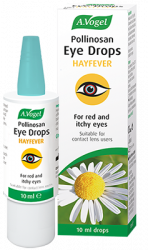An introduction to hayfever symptoms
Hayfever is caused by an allergic (or abnormally strong) response to pollen coming from grass, flowers and trees. It is sometimes descriptively referred to as ‘pollinosis’ – inflammation due to pollen.
Hayfever is part of the group of conditions known to doctors as allergic rhinitis, which can be defined as allergies to airborne substances causing inflammation in the nose (rhinitis) and also the eyes and throat.
Hayfever symptoms are variable
Symptoms of hayfever are extremely variable. One can be very troubled one spring and experience little or no symptoms the next year. Symptoms may also vary from one month to another for no apparent reason. Of course, the weather can be responsible for some of this fluctuation.
Another factor is the type of pollen one is allergic to:
- Tree pollen tends to affect people in spring
- Grass pollen affects people in late spring and summer
- Weed pollen can be found at high levels in late summer and autumn
People suffering from hayfever can also display allergies to animals (animal fur, hair or dander) and dust mites. In addition, they will also have a greater tendency to suffer from asthma and eczema.
Common symptoms of hayfever
People suffering from hayfever over-react to the presence of pollen settling on the tissues of the nose, throat and eyes. An inflammatory reaction is triggered and histamine is released. In the main, histamine is responsible for the symptoms of hayfever:
- Itching or watery eyes
- Sneezing
- Itching in the throat or nose
- Blocked or runny nose
Other hayfever symptoms
When hayfever is severe, other symptoms can develop including:
- Headaches and other pains in the face – this occurs when inflammation blocks the openings of sinuses, leading to an increase in pressure inside sinuses
- Loss of smell or taste – when inflammation affects the top of the nasal passages, the nerves giving us our sense of smell become ‘blocked’ and work less efficiently. This is the same situation as when we lose our sense of smell when suffering from a cold.
- Dry cough – this occurs when inflammation of the respiratory tract begins to irritate your throat.
In general, hayfever symptoms are not life-threatening. But they can be very debilitating and may affect your lifestyle severely. Someone with hayfever tends to stay indoors when the weather is good, unable to enjoy the sunny, dry days of summer.
Hayfever symptoms affecting the whole body
For most people, the inflammation caused by hayfever is localised to the eyes, nose and throat. However, in severe cases, the inflammation triggered by hayfever can sometimes affect the entire body.
When this happens, a number of symptoms may arise including:
- Feelings of tiredness or lethargy
- Itching all over the body
- A general feeling of irritability
In addition, those suffering from hayfever may exhibit a greater tendency for developing:
- Asthma, with symptoms of shortness of breath and wheezing
- Eczema, itching, dryness and scaling of affected skin
Who are the people more prone to hayfever?
People more likely to suffer from hayfever will have a tendency to over-react to normal, everyday substances such as pollen. You will be more likely to experience hayfever if you are:
- In your teenage years / during adolescence
- Male
- Asthmatic or if someone in your family has the condition
- Suffering from eczema or if someone in your family has this tendency
- Live in a house with smokers.





 Looking for relief of red and itchy eyes due to hayfever?
Looking for relief of red and itchy eyes due to hayfever?

